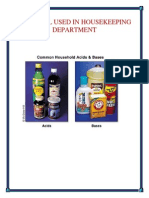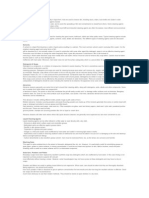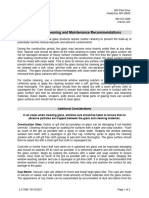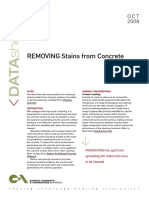Proper Way To Clean & Maintenance Granite Counter
Uploaded by
shienavapgscCopyright:
Available Formats
Proper Way To Clean & Maintenance Granite Counter
Uploaded by
shienavapgscOriginal Title
Copyright
Available Formats
Share this document
Did you find this document useful?
Is this content inappropriate?
Copyright:
Available Formats
Proper Way To Clean & Maintenance Granite Counter
Uploaded by
shienavapgscCopyright:
Available Formats
Granite Cleaning and Maintenance Procedures
For a deeper-cleaning solution, fill a spray bottle with a 50/50 mix of rubbing alcohol and
water; the spray cleaner gives granite surfaces a nice shine. A mix like this can also
help eliminate some germs and aid in disinfecting granite surfaces.
In general, granite surfaces should be cleaned with soft cotton cloths or clean rag mops
along with neutral cleaners, mild liquid dishwashing detergent and water, or cleaners
made specifically for granite. After washing with a soap solution, rinse the surface with
water, and dry with a soft cloth to eliminate water spots and streaking.
Always wipe up spills as they happen by blotting the spill so it doesn’t spread. Clean
the area with water and mild dish soap and rinse with clean water several times.
Though granite surfaces have some stain resistance, stains are still likely to pop up,
especially in food preparation areas and at bathroom vanity stations. Common stains
that mar kitchen and bathroom surfaces include oil-based and organic stains.
Maintenance Procedures
1. Always use coasters under glasses, particularly those containing alcohol or citrus
juices, and place hot dishes on trivets. Don't store staining items—such as
cooking oils and oil-based cosmetics and creams—on granite countertops.
2. Protect against abrasive sand, dirt, and grit. Frequently mop interior floors using
a clean non-treated dry dust mop. Minimize tracked-in dirt by placing slip-
resistant mats or area rugs inside and outside entrances. If using a vacuum
cleaner on granite floors, make sure that attachments and wheels are in tiptop
shape; worn equipment can scratch granite.
3. Stay on top of spills. Immediately blot (don't wipe) spills with a paper towel.
Wiping spreads spills. Flush the area with a mix of water and mild dish soap;
rinse several times. Dry the area thoroughly with a soft cloth. Repeat as
necessary.
4. Avoid harsh cleaners. Granites may contain trace levels of minerals that are acid
sensitive, so don't use cleaning products containing lemon, vinegar, or other
acids. Don't use scouring powders or abrasive creams or rust removers. Steer
clear of ammonia, bleach, or cleaning products with solvents or caustics that
could remove sealers.
You might also like
- Stone Marble, Granite and Ceramic Tiles Maintenance: ManualNo ratings yetStone Marble, Granite and Ceramic Tiles Maintenance: Manual5 pages
- Care and Maintenance Guide Stone Source 2016No ratings yetCare and Maintenance Guide Stone Source 201612 pages
- Ways On How To Clean The Bathroom and ToiletNo ratings yetWays On How To Clean The Bathroom and Toilet20 pages
- Caesarstone-Cleaning Guide. June 2019.ENNo ratings yetCaesarstone-Cleaning Guide. June 2019.EN2 pages
- Stainless Steel Care and Cleaning InstructionsNo ratings yetStainless Steel Care and Cleaning Instructions4 pages
- Chemicals Used in Cleaning and Sanitizing Kitchen Tools and Equipment100% (1)Chemicals Used in Cleaning and Sanitizing Kitchen Tools and Equipment57 pages
- Chemicals Used in Cleaning and Sanitizing Kitchen Tools and EquipmentNo ratings yetChemicals Used in Cleaning and Sanitizing Kitchen Tools and Equipment25 pages
- White and Purple Modern Employee Engagement PresentationNo ratings yetWhite and Purple Modern Employee Engagement Presentation19 pages
- Wood Works Furniture Maintenance: ManualNo ratings yetWood Works Furniture Maintenance: Manual3 pages
- Clean and Maintain Kitchen Tools Equipment and Premises. 1No ratings yetClean and Maintain Kitchen Tools Equipment and Premises. 160 pages
- Tle-Grade 9: Methods of Cleaning and Sanitizing Kitchen Tools and EquipmentNo ratings yetTle-Grade 9: Methods of Cleaning and Sanitizing Kitchen Tools and Equipment30 pages
- Housekeeping Dept 6-Ceaning Agent or ChemicalNo ratings yetHousekeeping Dept 6-Ceaning Agent or Chemical2 pages
- Sinks: Engineered Solid-Surface Care and CleaningNo ratings yetSinks: Engineered Solid-Surface Care and Cleaning1 page
- Glass Cleaning and Maintenance RecommendationsNo ratings yetGlass Cleaning and Maintenance Recommendations2 pages
- How To Remove Berry Stains From Clothes, Carpet, and UpholsteryNo ratings yetHow To Remove Berry Stains From Clothes, Carpet, and Upholstery4 pages



























































